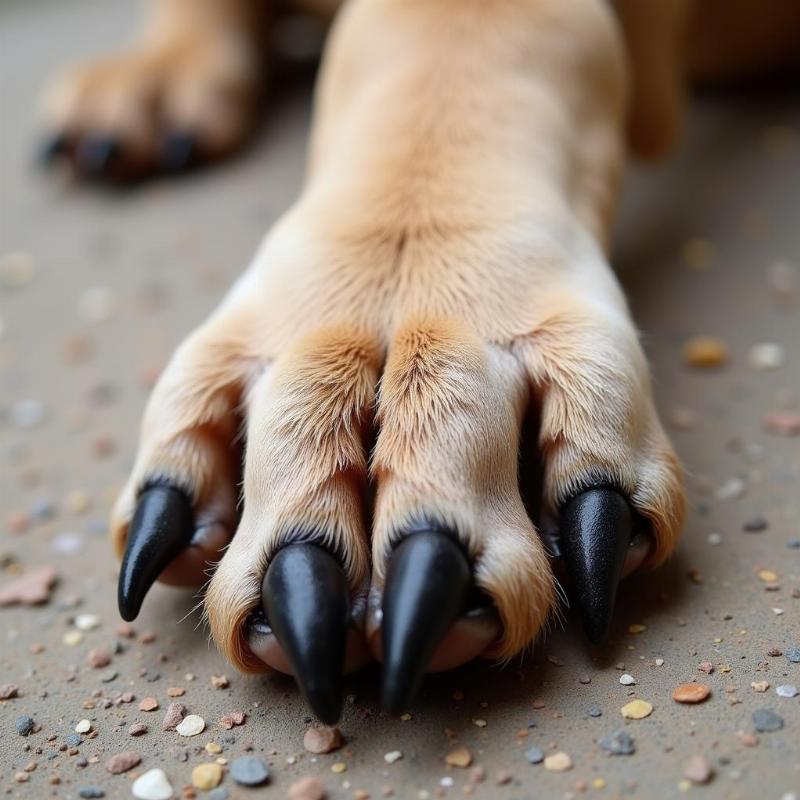It’s common to notice that your dog has black nails, and you might be wondering if it’s normal or a cause for concern. Understanding why your dog has black nails involves a look at genetics, breed characteristics, and even potential health implications. This article dives into the reasons behind black dog nails, providing you with the information you need to ensure your furry friend’s paw-some health.
The Genetics of Black Dog Nails
The most common reason for black nails in dogs is simply genetics. Just like humans inherit different hair and eye colors, dogs inherit nail color from their parents. If one or both parents have black nails, the chances of their puppies also having black nails are significantly higher. Many breeds are known for having predominantly black nails, such as Labrador Retrievers, German Shepherds, and Rottweilers. However, even within these breeds, you might occasionally see a dog with white or lighter-colored nails due to recessive genes.
 Black Dog Nails and Genetics
Black Dog Nails and Genetics
The pigment responsible for the black color in dog nails is called melanin, the same pigment that colors their skin and fur. The amount and distribution of melanin determine the intensity of the nail color. So, while some dogs have jet-black nails, others might have a darker brown or gray that appears black.
Breed-Specific Nail Coloration
Certain breeds are more likely to have black nails due to their genetic makeup. For instance, breeds with predominantly dark coats, like Doberman Pinschers and Great Danes, almost always have black nails. This correlation between coat and nail color is a common genetic trait. Conversely, breeds with lighter coats, like Golden Retrievers or Dalmatians, might have white, clear, or striped nails.
However, it’s essential to note that nail color isn’t a definitive breed identifier. Mixed-breed dogs can inherit a mix of nail colors from their parent breeds, leading to variations even within the same litter. Therefore, relying solely on nail color to determine breed is unreliable.
Health Considerations Related to Black Dog Nails
While black nails are usually a normal genetic trait, in rare cases, they can indicate an underlying health issue. For example, black streaks or discoloration on a previously light-colored nail could be a sign of melanoma, a type of skin cancer. If you notice any sudden changes in your dog’s nail color, especially accompanied by swelling, bleeding, or lameness, consult your veterinarian immediately.
Furthermore, excessively long black nails can cause discomfort and difficulty walking. Regular nail trims are essential for all dogs, regardless of nail color. Long nails can curl inwards, putting pressure on the paw pads and leading to pain or infection.
Conclusion
Understanding why your dog has black nails primarily involves understanding genetics and breed predispositions. While black nails are typically a normal and harmless trait, it’s crucial to be aware of potential health implications and monitor your dog’s nail health regularly. By observing your dog’s paws and seeking veterinary care when needed, you can ensure your furry companion stays happy and healthy.
FAQ
- Are black nails more common in certain dog breeds? Yes, breeds with darker coats often have black nails due to genetic links between coat and nail pigmentation.
- Can a dog’s nails change color? Yes, while rare, changes in nail color can sometimes indicate a health problem like melanoma. Consult your vet if you notice sudden changes.
- How often should I trim my dog’s black nails? Regular nail trims are crucial. The frequency depends on how quickly the nails grow, typically every 2-4 weeks.
- Is it harder to trim black nails than white nails? Yes, it can be trickier to see the quick (the pink part of the nail containing blood vessels) in black nails. Use a specialized dog nail clipper and trim small bits at a time.
- What should I do if I accidentally cut the quick while trimming my dog’s black nails? Apply styptic powder or cornstarch to stop the bleeding. If the bleeding persists, contact your vet.
- Can diet affect my dog’s nail color? While diet primarily affects coat and skin health, it doesn’t directly influence nail color, which is determined by genetics.
- Should I be concerned if my dog’s black nails are brittle? Brittle nails can sometimes indicate nutritional deficiencies or underlying health issues. Consult your vet for advice.
Introducing Beautdogs.us
Beautdogs.us – your trusted source for comprehensive dog care in the US. We provide expert guidance on all dog breeds, from the common to the rare, along with in-depth knowledge on health care, nutrition, and training. Our platform offers practical advice on responsible pet ownership, including legal matters and financial planning. We also review and recommend quality pet products, from food to grooming supplies. Whether you’re a new dog owner or a seasoned one, Beautdogs.us is your one-stop destination for all things canine. When you need support, please contact Email: [email protected] for detailed and accurate answers.